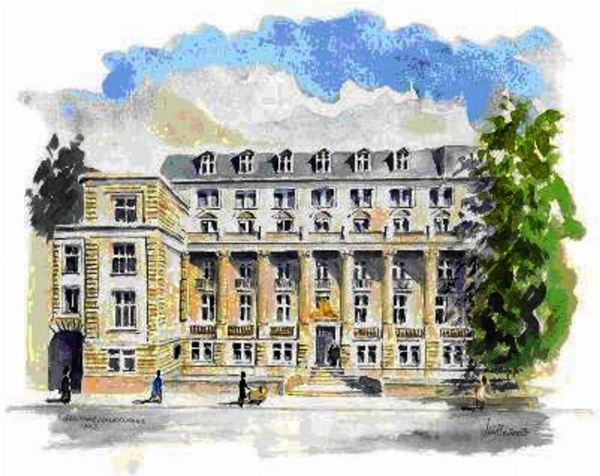DGD Krankenhaus Sachsenhausen gGmbH

Schulstr. 31
60594 Frankfurt
Phone:
069-6605-0
Fax:
069-6605-1709
Mail:
ed.mff-shk@noitkerid-hk
ed.mff-shk@noitkerid-hk
ed.mff-shk@noitkerid-hk
- Number of beds: 192
- Number of specialist departments: 5
- Number of inpatient cases: 9.645
- Number of outpatient cases: 1.971
- Hospital owners: Deutscher Gemeinschafts-Diakonieverband GmbH, Marburg
- Type of provider: freigemeinnützig
Further information
| Bezeichnung | |
| Teilnahme externe Qualitätssicherung | yes |
Diabetes mellitus Typ 1
Zertifiziertes Behandlungszentrum (DDG)
- Implementation of the minimum quantity agreement
No participation
- Implementation of resolutions of the Federal Joint Committee on quality assurance (G-BA)
No participation
- Clarifying chat completed: no
- Clarifying chat not completed: no
- No participation in clarifying chat: no
- Notification of non-fulfilment of nursing care not made: no
| Number | Group |
|---|---|
| 36 | Medical specialists (m/f) , psychological psychotherapists (m/f) and child and adolescent psychotherapists (m/f) who are subject to the obligation to undergo further training* |
| 36 | Number of medical specialists (m/f) from no. 1 who have completed a five-year period of further training and are therefore subject to the obligation to provide evidence |
| 34 | Number of those persons from no. 2 who have provided proof of further training according to Article 3 of the G-BA regulations |
According to Section 4 (2) of the Quality Management Guideline, facilities must provide for the prevention of and intervention in cases of violence and abuse as part of their internal quality management. The aim is to prevent, recognise and respond appropriately to abuse and violence, particularly against vulnerable patient groups such as children and adolescents or people in need of help, and also to prevent it within the facility. The respective procedure is aligned with the size of the facility, the range of services and the patients in order to define customised solutions for sensitising the teams as well as other suitable preventative and interventional measures. These may include information materials, contact addresses, training/education, codes of conduct, recommendations for action/intervention plans or comprehensive protection concepts.
- Is a protection concept in place? Yes
- No care for children and young people
- Kinder werden nur notfallmäßig in der ZNA versorgt und ggfs. weiterverlegt
- Drug commission
Training of employees on AMTS related topics
Electronic support for the admission and anamnesis process (e.g. import of patient master data or medication plans, use of a drug knowledge database, input screen for drugs or anamnesis information)
Umgang mit Arznei-und Betäubungsmitteln
11.04.2023
Provision of one or more electronic drug information systems (e.g. Lauer-Taxe®, ifap klinikCenter®, Gelbe Liste®, Fachinfo-Service®)
- Fallbesprechungen
- Spezielle AMTS-Visiten (z. B. pharmazeutische Visiten, antibiotic stewardship, Ernährung)
- Aushändigung von arzneimittelbezogenen Informationen für die Weiterbehandlung und Anschlussversorgung der Patientin oder des Patienten im Rahmen eines (ggf. vorläufigen) Entlassbriefs
- Aushändigung des Medikationsplans
- bei Bedarf Arzneimittel-Mitgabe oder Ausstellung von Entlassrezepten
- Admission to hospital, including anamnesis
; Instruments and measures are presented for determining the old medication (drug history), the subsequent clinical assessment and the switch to the medication available in the hospital (house list), as well as for documenting both the patient's original medication and that for hospital treatment adapted medication.
- Medication process in the hospital
In this context, the following sub-processes are assumed as examples: drug history - prescription - patient information - drug delivery - drug use - documentation - therapy monitoring - result assessment. Instruments and measures for safe medication prescription can be presented, e.g. B. in terms of readability, clarity and completeness of the documentation, but also in terms of area of application, effectiveness, benefit-risk ratio, tolerability (including potential contraindications, interactions, etc.) and resource considerations. Information can also be provided to support reliable medication ordering, delivery and use or administration.
- Discharge
In particular, the measures taken by hospitals can be presented to ensure that information on drug therapy is structured and passed on to doctors and physicians providing further treatment, as well as the appropriate provision of patients with drug information, medication plans and medications. Drug prescriptions are made.
Job
FL02 - Lectureships / teaching posts at universities of applied sciences
Explanation
Explanation
Professor Dr. med. Claudius Teupe, Wolfgang-Goethe Universität Frankfurt, Prof. Dr. med. Dr. oec. troph. Jürgen Stein, Wolfgang Goethe Universität Frankfurt
FL07 - Initiation and management of uni-centric/multi-centric clinical/scientific studies
Explanation
Explanation
Akademisches Lehrkrankenhaus der Johann Wolfgang Goethe-Universität Frankfurt am Main und Akademische Lehreinrichtung für Physiotherapie der Fachhochschule Fulda.
FL09 - Doctoral supervision
Explanation
Training in other healing professions
Comment
in Kooperation
HB01 - Nurse and health care worker (m/f)
Comment
Comment
in Kooperation
Comment
in Kooperation
- Hospital staff
- Explanations: Kooperation mit Schwanenapotheke/Offenbach
Heike Anders
Qualitätsmanagementbeauftragte/ Qualitäts- / Beschwerde-/ Risikomanagement
Schulstr. 31
60594 Frankfurt
Phone:
069
-6605-1780
Mail:
ed.mff-shk@srednah
Heike Anders
Qualitätsmanagementbeauftragte/ Qualitäts- Beschwerde- und Risikomanagement
Schulstr. 31
60594 Frankfurt
Phone:
069
-6605-1780
Mail:
ed.mff-shk@srednah
seit 01.03.2024 Dr. Tobias Leipold
Ärztlicher Direktor
Schulstr. 31
60594 Frankfurt
Phone: 069 -6605-1171
Dr. Guido Kruse
Leiter Vertragsapotheke
Schulstr. 31
60594 Frankfurt
Phone:
069
-809066-0
Mail:
ue.ekehtopa-nenawhcs@ofni
Matthias Wagner
TeamleitungTechnik
Schulstr. 31
60594 Frankfurt
Phone:
069
-6605-1626
Mail:
ed.mff-shk@rengawm
60594 Frankfurt
Phone:
069-6605-0
Fax:
069-6605-1709
Mail:
ed.mff-shk@noitkerid-hk
Anette Liller
Pflegedirektorin
Schulstr. 31
60594 Frankfurt
Phone:
069
-6605-1202
Mail:
ed.mff-shk@rellila
ab 01.07.2024 Thomas Anderson
Pflegedirektor
Schulstr. 31
60594 Frankfurt
Phone:
069
-6605-1202
Mail:
ed.mff-shk@nosrednat
Abir Giacaman
Geschäfstführerin
Schulstr. 31
60594 Frankfurt
Phone:
069
-6605-1706
Mail:
ed.mff-shk@noitkerid-hk
ab 01.03.2024 Geschäftsführung Dr. Caudia Fremder
Geschäftsführung
Schulstr. 31
60594 Frankfurt
Phone:
069
-6605-1706
Mail:
ed.mff-shk@noitkerid-hk
ab 01.03.2024 Geschäftsführung Hubertus Jaeger
Geschäftsführung
Schulstr. 31
60594 Frankfurt
Phone:
069
-6605-1706
Mail:
ed.mff-shk@noitkerid-hk
Dr. Claudia Fremder
Geschäftsführerin
Schulstr. 31
60594 Frankfurt
Phone:
069
-6605-1706
Mail:
ed.mff-shk@noitkerid-hk
Professor Dr. Amadeus Hornemann
Chefarzt Abteilung Gynäkologie und Geburtshilfe
Schulstr. 31
60594 Frankfurt
Phone:
069
-6605-1141
Mail:
ed.mff-shk@nnamenroha
ab 01.03.2024 Dr. Tobias Leipold
Chefarzt Anästhesteise, Intensivmedizin und Schmerztherapie
Schulstr. 31
60594 Frankfurt
Phone:
069
-66051171-
Mail:
ed.mff-shk@dlopielt
IK: 260610177
Location number: 771347000
